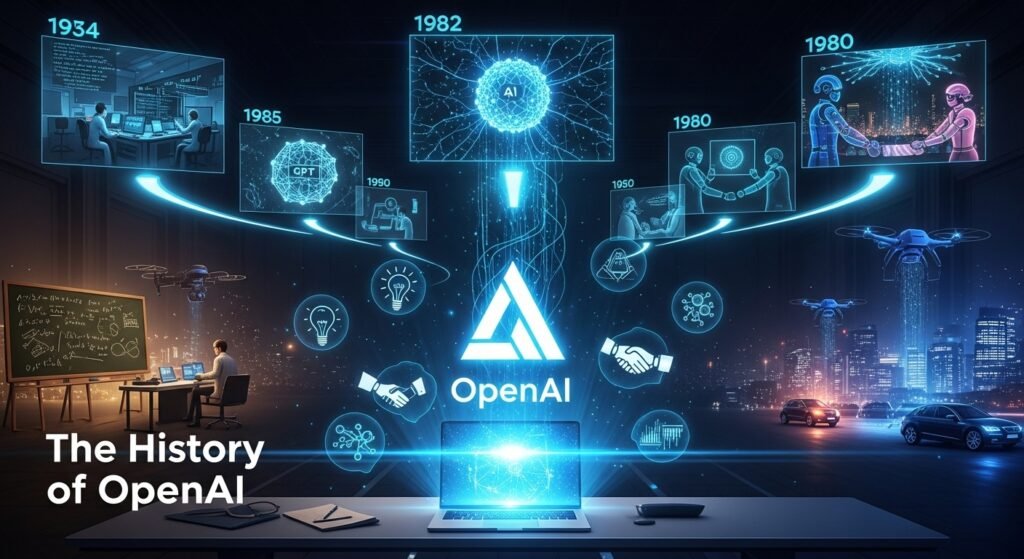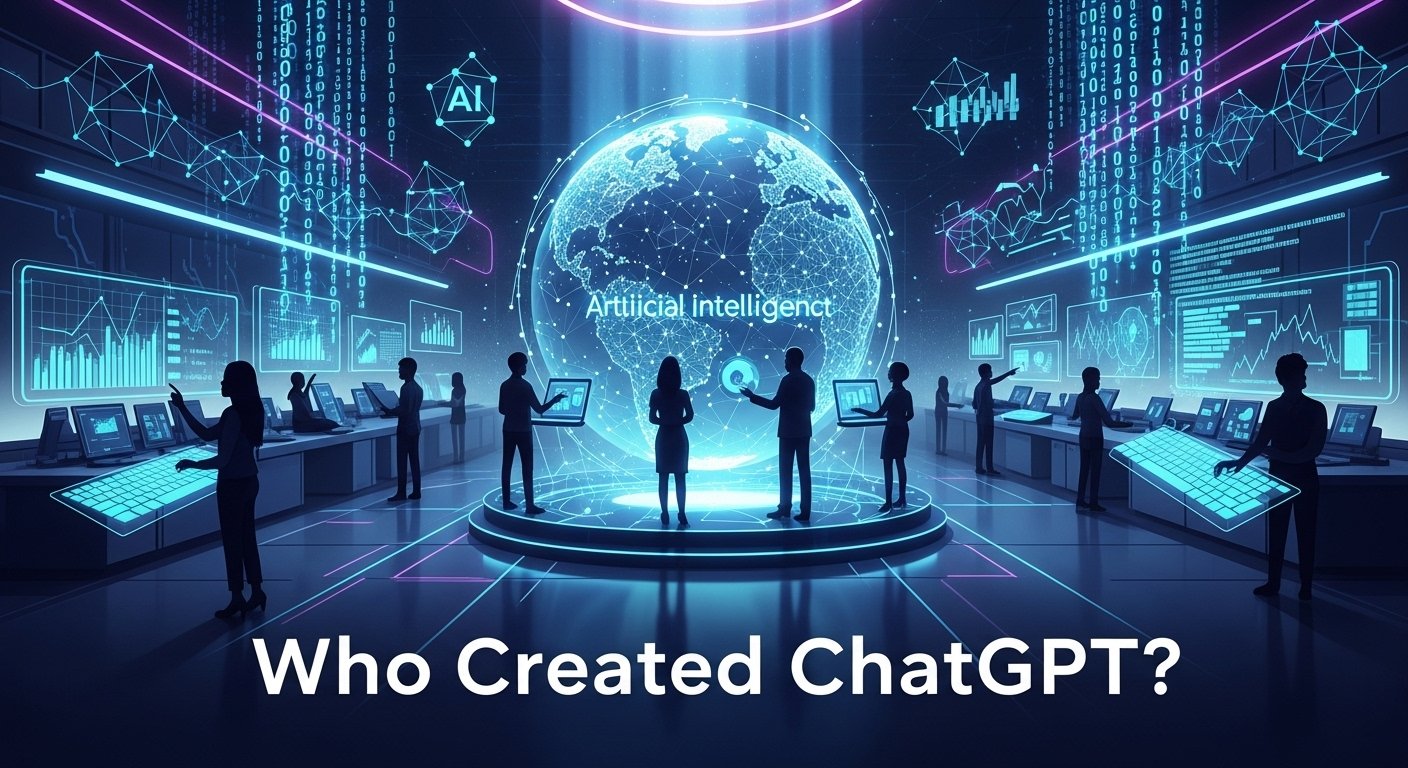ChatGPT is a powerful artificial intelligence (AI) chatbot that has taken the world by storm since its release on November 30, 2022. Developed by OpenAI, it can answer questions, write essays, generate code, and assist with countless tasks. Its ability to produce human-like responses has made it a go-to tool for students, professionals, and curious minds alike. But who exactly is behind this groundbreaking technology? This article explores the creators, the technology, and the impact of ChatGPT.
The Creators Behind ChatGPT
ChatGPT was developed by OpenAI, an AI research organization founded in 2015. The key individuals who played a significant role in its creation include:
- Sam Altman: The CEO of OpenAI, known for his leadership in tech and his role at Y Combinator, a startup accelerator. Altman has been a driving force in scaling OpenAI’s vision.
- Greg Brockman: A co-founder and former Chief Technology Officer, Brockman contributed to the technical development of ChatGPT.
- Ilya Sutskever: OpenAI’s Chief Scientist and co-founder, an expert in deep learning who helped shape the AI models behind ChatGPT.
- Wojciech Zaremba: A co-founder with a background in machine learning, Zaremba contributed to the research that led to ChatGPT.
- John Schulman: Another co-founder, Schulman specializes in reinforcement learning, a key technique used in ChatGPT’s development.
Elon Musk, a well-known entrepreneur, was also a co-founder of OpenAI. He provided early funding and vision but left the company in 2018 and no longer has any involvement. Other notable early supporters included Peter Thiel and Reid Hoffman, who pledged $1 billion to OpenAI in 2015 to advance AI research.
Who Owns ChatGPT? The Truth Behind Its Ownership
The History of OpenAI

OpenAI was founded in December 2015 with a mission to develop artificial general intelligence (AGI) that benefits humanity. Initially a nonprofit, it transitioned to a for-profit model with a capped-profit structure in 2019. This change allowed OpenAI to attract significant investments while maintaining its focus on responsible AI development.
Key milestones in OpenAI’s history include:
- 2015: Founded by Sam Altman, Greg Brockman, Ilya Sutskever, Wojciech Zaremba, John Schulman, and Elon Musk.
- 2018: Elon Musk left the board and sold his stake, citing concerns about AI safety.
- 2019: Microsoft invested $1 billion, becoming OpenAI’s preferred partner for commercializing AI technologies.
- 2020: Release of GPT-3, a major step toward ChatGPT.
- 2022: Launch of ChatGPT, which gained over one million users within five days.
- 2023: Microsoft announced a multi-year, multi-billion-dollar investment in OpenAI, further integrating its technology into products like Bing and Edge.
| Year | Milestone |
|---|---|
| 2015 | OpenAI founded as a nonprofit |
| 2018 | Elon Musk leaves OpenAI |
| 2019 | Microsoft invests $1 billion |
| 2020 | GPT-3 released |
| 2022 | ChatGPT launched |
| 2023 | Microsoft’s multi-billion-dollar investment |
How ChatGPT Was Developed
ChatGPT is built on the GPT (Generative Pre-trained Transformer) series of language models, which use advanced natural language processing (NLP) techniques. The journey began with GPT-1 in 2018, followed by GPT-2 in 2019, and GPT-3 in 2020. ChatGPT is based on GPT-3.5, with later advancements leading to GPT-4.
The development process involved several key steps:
- Training on vast datasets: ChatGPT was trained on large amounts of publicly available text from the internet, allowing it to understand and generate human-like language.
- Reinforcement learning from human feedback (RLHF): Human AI trainers provided conversations and ranked responses, helping the model learn to produce more accurate and helpful answers.
- Fine-tuning with reward models: These models evaluate and rank possible responses, enabling continuous improvement of the chatbot’s performance.
ChatGPT’s training took place on Microsoft’s Azure AI supercomputing infrastructure, ensuring the computational power needed for such a complex model. The result is a chatbot capable of understanding context, answering questions, and performing tasks with remarkable accuracy.
Key NLP Terms and Technologies
ChatGPT relies on several important NLP concepts and technologies, including:
- Natural Language Processing (NLP): The field of AI that enables computers to understand and generate human language.
- Generative Pre-trained Transformer (GPT): A type of AI model that uses transformer architecture to generate text based on input prompts.
- Reinforcement Learning: A machine learning technique where the model learns by receiving feedback on its actions.
- Deep Learning: A subset of machine learning that uses neural networks to process complex data patterns.
- Large Language Models (LLMs): AI models trained on massive datasets to perform language-related tasks.
These technologies allow ChatGPT to process user inputs, understand context, and generate coherent responses.
The Impact of ChatGPT
Since its launch, ChatGPT has been used for a wide range of applications, including:
- Content Creation: Writing articles, stories, social media posts, and even poetry.
- Coding Assistance: Helping developers write, debug, and understand code.
- Education: Assisting students with homework, research, and essay writing.
- Customer Support: Powering automated chatbots for businesses.
Its accessibility—available for free via OpenAI’s website—has contributed to its widespread adoption. Within five days of its release, ChatGPT had over one million users, and its popularity continues to grow.
However, ChatGPT’s rise has also sparked debates. Some praise its ability to streamline tasks and boost productivity, while others, including Elon Musk, have raised concerns about AI’s potential risks. Musk has called AI “one of the biggest risks to civilization,” highlighting the need for responsible development and oversight.
Ownership and Funding
OpenAI, the creator of ChatGPT, is a privately owned company led by CEO Sam Altman. It has received significant funding from investors, including:
- Microsoft: Invested $1 billion in 2019 and a multi-billion-dollar sum in 2023, integrating OpenAI’s technology into its products.
- Early Investors: Peter Thiel, Reid Hoffman, and others who pledged $1 billion in 2015.
Elon Musk no longer holds a stake in OpenAI, having sold his shares when he left in 2018. OpenAI’s valuation reached $29 billion in 2023, reflecting its growing influence in the AI industry.
Frequently Asked Questions
Who created ChatGPT?
ChatGPT was created by OpenAI, with key contributions from Sam Altman, Greg Brockman, Ilya Sutskever, Wojciech Zaremba, and John Schulman. Elon Musk was a co-founder but is no longer involved.
When was ChatGPT released?
ChatGPT was released on November 30, 2022, and quickly gained over one million users within five days.
How does ChatGPT work?
ChatGPT uses the GPT-3.5 model, trained on large datasets with reinforcement learning from human feedback. It processes user inputs using NLP to generate human-like responses.
What is OpenAI?
OpenAI is an AI research company founded in 2015 to develop artificial general intelligence (AGI) that benefits humanity. It started as a nonprofit and later became a for-profit company with a capped-profit model.
Who owns ChatGPT?
ChatGPT is owned by OpenAI, a privately held company led by Sam Altman. Microsoft is a major investor but does not own OpenAI.
What are the concerns about ChatGPT?
While ChatGPT is praised for its capabilities, some worry about its potential to disrupt jobs and industries. Elon Musk and others have highlighted the risks of advanced AI if not developed responsibly.
Conclusion
ChatGPT represents a major milestone in AI development, created by OpenAI’s talented team of researchers and engineers. From its roots in the GPT series to its widespread use today, ChatGPT has transformed how we interact with technology. While it offers immense potential for productivity and creativity, it also raises important questions about the future of AI. As OpenAI continues to advance its research, the legacy of ChatGPT will likely shape the AI landscape for years to come.
